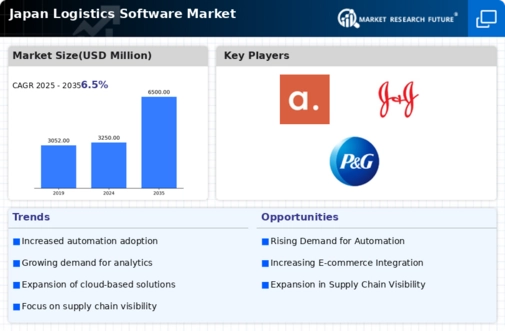Rising E-Commerce Demand
The Japan logistics software market is experiencing a notable surge in demand driven by the rapid growth of e-commerce. As online shopping continues to gain traction, logistics companies are increasingly adopting software solutions to streamline their operations. In 2025, the e-commerce sector in Japan was valued at approximately 20 trillion yen, indicating a robust market for logistics software that can efficiently manage order fulfillment, inventory, and delivery processes. This trend suggests that logistics software providers must innovate to meet the evolving needs of e-commerce businesses, thereby enhancing their competitive edge in the Japan logistics software market.
Focus on Supply Chain Resilience
The Japan logistics software market is increasingly focused on enhancing supply chain resilience. Recent disruptions in global supply chains have highlighted the need for robust logistics solutions that can adapt to unforeseen challenges. Companies are now prioritizing software that offers real-time visibility, risk management, and contingency planning features. In 2025, it was reported that 70% of logistics firms in Japan are investing in software solutions to improve their supply chain resilience. This trend indicates a shift towards more proactive logistics management, which is expected to drive demand for innovative software in the Japan logistics software market.
Government Initiatives and Support
The Japan logistics software market benefits from various government initiatives aimed at enhancing logistics efficiency. The Ministry of Land, Infrastructure, Transport and Tourism has implemented policies to promote digital transformation within the logistics sector. These initiatives include subsidies for technology adoption and support for research and development in logistics software. Such government backing not only encourages investment in logistics technology but also fosters collaboration between public and private sectors. As a result, logistics companies are more likely to invest in advanced software solutions, thereby propelling growth in the Japan logistics software market.
Growing Emphasis on Sustainability
Sustainability has become a critical driver in the Japan logistics software market. As environmental concerns rise, logistics companies are seeking software solutions that facilitate eco-friendly practices. This includes optimizing routes to reduce carbon emissions and implementing waste reduction strategies. In 2025, approximately 60% of logistics firms in Japan reported that they are prioritizing sustainability in their operations. This growing emphasis on sustainable logistics practices is likely to spur demand for software that can help companies track and report their environmental impact, thereby shaping the future of the Japan logistics software market.
Integration of Artificial Intelligence
The integration of artificial intelligence (AI) into logistics software is transforming the Japan logistics software market. AI technologies enable predictive analytics, route optimization, and enhanced decision-making capabilities. In 2025, it was estimated that AI adoption in logistics could lead to a 15% reduction in operational costs for logistics companies. This potential for cost savings is prompting logistics firms to invest in AI-driven software solutions. Consequently, the demand for sophisticated logistics software that incorporates AI functionalities is likely to increase, positioning the Japan logistics software market for substantial growth.













